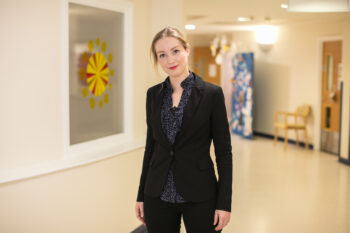
Lindsay van Dijk has been appointed to head up the chaplaincy and pastoral care team at Sheffield Teaching Hospitals NHS Foundation Trust, which provides person-centred pastoral and spiritual care. As a head of service role, this is the most senior role a humanist pastoral carer has ever held in the NHS. She is also the youngest person to have held such a position. Humanists UK has congratulated Ms van Dijk. It hopes her appointment will encourage other trusts to embrace more inclusive and diverse pastoral care teams.
Research shows that only 4% of hospital visits by religious chaplains are to non-religious patients. This suggests that non-religious people’s pastoral needs are not met when an NHS trust only has religious chaplains. People in need of support should be able to choose to speak to someone who shares their worldview. Until recently, only religious chaplains provided this kind of service. But recently some NHS trusts have started to introduce non-religious pastoral carers.
Previously, Ms Van Dijk was Lead Chaplain at Buckinghamshire Healthcare NHS Trust. She is also the chair of the Non-Religious Pastoral Support Network (NRPSN), which is part of Humanists UK. She holds a BA and MA in humanist pastoral care from the University of Humanistic Studies in the Netherlands. She is currently studying for a PhD in humanist pastoral care. She worked at the Humanist Community at Harvard as a humanist pastoral carer. She held posts in a hospice and nursing home for elderly patients with advanced Alzheimer’s disease. She has also worked as a humanist pastoral carer at a UK secondary school. She is a member of the British Association for Counselling & Psychotherapy (BACP) and accredited by the UK Board of Healthcare Chaplaincy (UKBHC).
Welcoming the appointment, Humanists UK’s Head of Humanist Care Clare Elcombe Webber commented,
‘I am delighted that Lindsay has been appointed to such a senior role within an NHS Trust. A few years ago, such opportunities were not open to humanists. Non-religious people were not able to get the like-minded support that they needed. It is a mark of how far we have come that a humanist is a Head of Chaplaincy and Pastoral Care. We hope this appointment will be a catalyst not only for other trusts to embrace inclusion and diversity, but other public institutions such as the prison service and armed forces to do the same.’
On her appointment, Lindsay van Dijk commented,
‘It is a great honour to be appointed to this position. The heart of my role is to ensure that patients get the person-centred care that they need and is right for them.’
NHS England is currently reviewing its Chaplaincy Guidelines, which set out best practice across pastoral, spiritual, and religious care. Humanists UK is currently working with other religion and belief groups to make sure that the new guidelines address issues of equality and inclusion as standard practice. This includes the need for non-religious pastoral care.
Notes:
For further comment or information, please contact Humanists UK Director of Public Affairs and Policy Richy Thompson at press@humanists.uk or phone 020 7324 3072 or 020 3675 0959.
Ms van Dijk has made an image available for use by media. Photo credit Edward Thompson. Twitter @_edthompson, Instagram @mredthompson.
Read more about Humanist Care.
Read more about the work of the Non-Religious Pastoral Support Network.
Humanists UK is the national charity working on behalf of non-religious people. Powered by 100,000 members and supporters, we advance free thinking and promote humanism to create a tolerant society where rational thinking and kindness prevail. We provide ceremonies, pastoral care, education, and support services benefitting over a million people every year and our campaigns advance humanist thinking on ethical issues, human rights, and equal treatment for all.
In 2021, Humanists UK is celebrating its 125th anniversary with a renewed focus on its history. The new website Humanist Heritage is a rich new web resource that uncovers the untold story of humanism in the UK – a story of people, groups, objects, places, movements, publications, and ideas.
